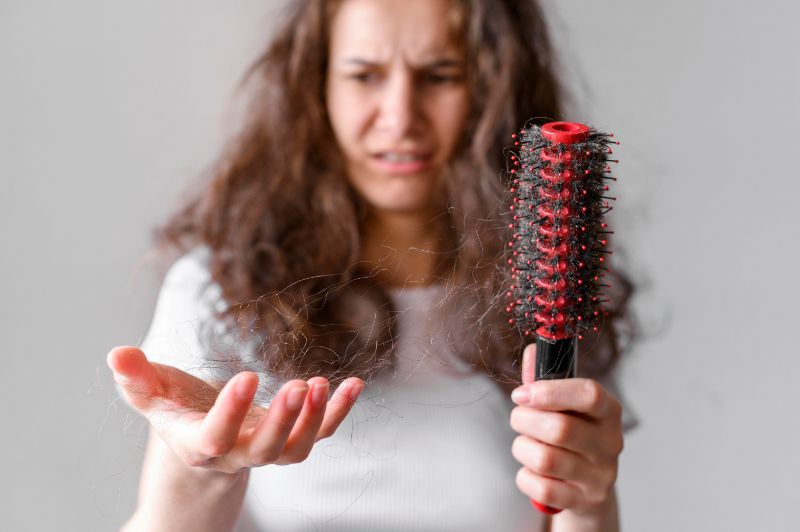Antidepressants help many people to escape the prison of their disabling symptoms derived from depression and anxiety. Just like most medications, however, they carry their side effects with them. More disconcerting is the fact that they may cause hair loss. If you’re taking an antidepressant and you’re shedding more hair than normal down the drain, then rest assured: you’re not alone. In this guide, we will describe the relations between the mentioned groups of drugs and hair loss for commonly used medications like Lexapro, Sertraline, Pristiq, Prozac, Luvox, Lamictal, Celexa, and Mirtazapine. We also discuss whether hair loss due to these medications is reversible or not and provide some general tips regarding this problem.

The Connection Between Antidepressants and Hair Loss
Antidepressants are reported to have a long list of side effects, and hair loss is one of the more disturbing ones. Not all of them affect every user, but how and why some users experience hair loss must first be understood. For example, hair loss in connection with Lexapro is likely related to the changes that medication brings to the balance of the body’s hormones. The thinning of hair is caused by the hair shafts becoming thin, and they fall off easily.
Likewise, a link between Sertraline and hair loss can be made due to a similar mechanism. Both Lexapro and Sertraline belong to the SSRI group, which has already been demonstrated to interfere with the cycles of hair growth. If these cycles are interfered with, the results can sometimes be lamentable about hair loss.
Lexapro and Hair Thinning: What You Need to Know
Of the more common side effects, Lexapro hair thinning does occur in many people who use this drug. Lexapro is a commonly prescribed SSRI. It functions by altering serotonin levels in the brain, which then indirectly has an impact on the other systems of the body, including hair growth. Hair goes through cycles where it grows as well as being Unknown Shedding occurs in cycles, so when those are changed in routine by changes in hormone levels, thinning occurs.
In case you experience excessive hair fall due to Lexapro, make sure you consult your healthcare provider, who might recommend a change in the dose or an alternative medication. However, keep in mind that hair thinning resulting from Lexapro might just be temporary and may get better over time.
Comparing Antidepressants: Pristiq vs. Prozac
One of the first things that come to mind when considering different antidepressants is, of course, the various side effects associated with them. Pristiq vs. Prozac is a very common comparison since both are common and well-loved drugs that are very useful in curing depression and anxiety. Prozac is another SSRI that has been around for years and has proven to be effective. The same as Lexapro, Prozac can also cause hair loss in some individuals.
On the other hand, Pristiq is a serotonin-norepinephrine reuptake inhibitor, which means it works on both serotonin and norepinephrine. This dual action is what renders Pristiq potent against some forms of depression but is also the cause of hair loss. When comparing Pristiq vs. Prozac, one should consider making a decision depending on how one’s body reacts to the medication and discuss possible side effects with the healthcare provider.
Luvox vs. Lexapro: How Do They Compare?
Another common comparison is the one between Luvox and Lexapro, which can be quite disconcerting to some users with an interest in avoiding side effects such as hair loss at all costs. Both of these drugs are SSRIs; however, they differ in the spectrum of their therapeutic applications. Luvox is for the treatment of a large number of illnesses, including OCD, while Lexapro is very effective against majors in terms of depression and generalized anxiety disorder.
Both Luvox and Lexapro can cause hair to thin, although this may vary among different people. Always ensure that your symptoms are kept under check and reported to your doctor, who may be able to switch you to another SSRI or alter the dosage.
Lamictal and Celexa: What You Should Know
Two other medications that are commonly associated with hair loss are Lamictal and Celexa. The main use of Lamictal is as a mood stabilizer for bipolar disorder; it works in a completely different manner than the SSRIs. The risk of hair loss is less with it, though it is not entirely without that risk.
Another SSRI, Celexa, has many similarities to Lexapro in its impact on hair. Thinning of the hair, as well as hair loss on Celexa, is quite similar to that on Lexapro because both drugs affect serotonin levels, leading to the disbalancing of the hair growth cycles. If you are taking either Lamictal or Celexa, and you have hair loss, it’s important to consult your healthcare provider to discuss possible solutions.
Does Mirtazapine Cause Hair Loss?
Does mirtazapine cause hair loss? This is one of those questions that patients always seem to ask when they start taking this antidepressant. While SSRIs are different, Mirtazapine is a NaSSA – a noradrenergic and specific serotonergic antidepressant. It does have its way of working and doesn’t come with a clean slate of side effects either.
The occurrence of Mirtazapine-causing hair loss is less common compared to what often occurs with SSRIs. However, the occurrence can still become a reality. So, if you start losing your hair, weigh the risks and benefits of this medication. Most of the time, the positives of continuing to take the medication will outweigh the negatives of hair loss. An individual’s healthcare professional should discuss this.
Is Hair Loss from Antidepressants Permanent?
Most people who lose their hair from taking antidepressants have the question of whether the problem is permanent or not. The good thing is, in most cases, hair loss from antidepressants is never permanent. Usually, hair grows back once the body gets used to the medication—or if you stop using medication. However, it varies from person to person how long it will take for your lost hair to grow back.
It is essential to be patient, and one has to take the necessary guidance from your doctor. At times, they may prescribe treatments like topical minoxidil or dietary supplements that can expedite the regrowth. However, avoid self-prescription and always reach out to your doctor before starting any new treatment.
Desvenlafaxine and Hair Loss: What to Expect
Desvenlafaxine is taken to treat the problem of anxiety and other depressive disorders. As in the case of most other antidepressants, the possibility of experiencing side effects includes hair loss from the use of the drug. On Desvenlafaxine and your hair has been thinning, don’t forget all other possible causes such as stress, poor diet, or even general health.
While it remains true that Desvenlafaxine works well for most, hair loss may become a concerning factor in their life. Monitoring your symptoms, coupled with proper communication with your healthcare provider, becomes very important here in managing such side effects.
Tips for Managing Hair Loss While on Antidepressants
If you’re losing hair on Lexapro, Sertraline, or for that matter, any other kind of antidepressant, fret not, as hope’s not all lost; there can be a way around it. First, speak to your doctor. They may lower the dose of your medication or prescribe another one that doesn’t have the same side effects.
In addition to working together with your healthcare provider, there are a few lifestyle changes that assist in maintaining good hair health. These are a well-balanced diet that is full of vitamins and minerals, gentle hair care, and stress management that promotes healthier hair.
If the loss of hair persists, consider visiting a dermatologist experienced with problems relating to hair loss. He or she can offer extra therapy or input on the management of such side effects.
Conclusion
Losing hair can be depressing at the very least. It is just a side effect that happens too frequently—such as with Lexapro, Sertraline, Pristiq, Prozac, Luvox, Lamictal, Celexa, and Mirtazapine. Although the occurrence of Lexapro hair thinning and other types of hair loss on antidepressants can be alarming, it is usually transient and fairly manageable.
You can keep yourself well-informed and cooperative with your doctor to find a treatment plan that’s just right for you without compromising the health of your hair. Remember that nothing matters more than your mental health, and there’s always a way to tackle the side effects such as hair loss.
Frequently Asked Questions (FAQs)
Does Lexapro cause hair thinning?
- Yes, hair thinning is one of the effects likely to be experienced by some users of Lexapro. It results from the influence of this medication on hormonal levels and hair growth cycles.
Is hair loss from Sertraline permanent?
- In most cases, hair loss from Sertraline is not permanent. The hair usually grows back once the body adapts to the drug or when medication is discontinued.
How does Pristiq vs Prozac differ in terms of side effects?
- Most Pristiq vs Prozac comparisons concern side effects. Both medications lead to hair loss, but the symptoms and the giving of the results are different for everyone.
What Medications are less likely to cause hair loss?
- For instance, Lamictal is less likely to prompt hair loss compared to SSRIs like Lexapro and Prozac. However, the reaction will vary from one person to another.
How long does it take for hair to grow back after stopping antidepressants?
- Hair regrowth after stopping antidepressants may take several months. Yet again, this varies from person to person due to various factors that include health conditions and diet.











